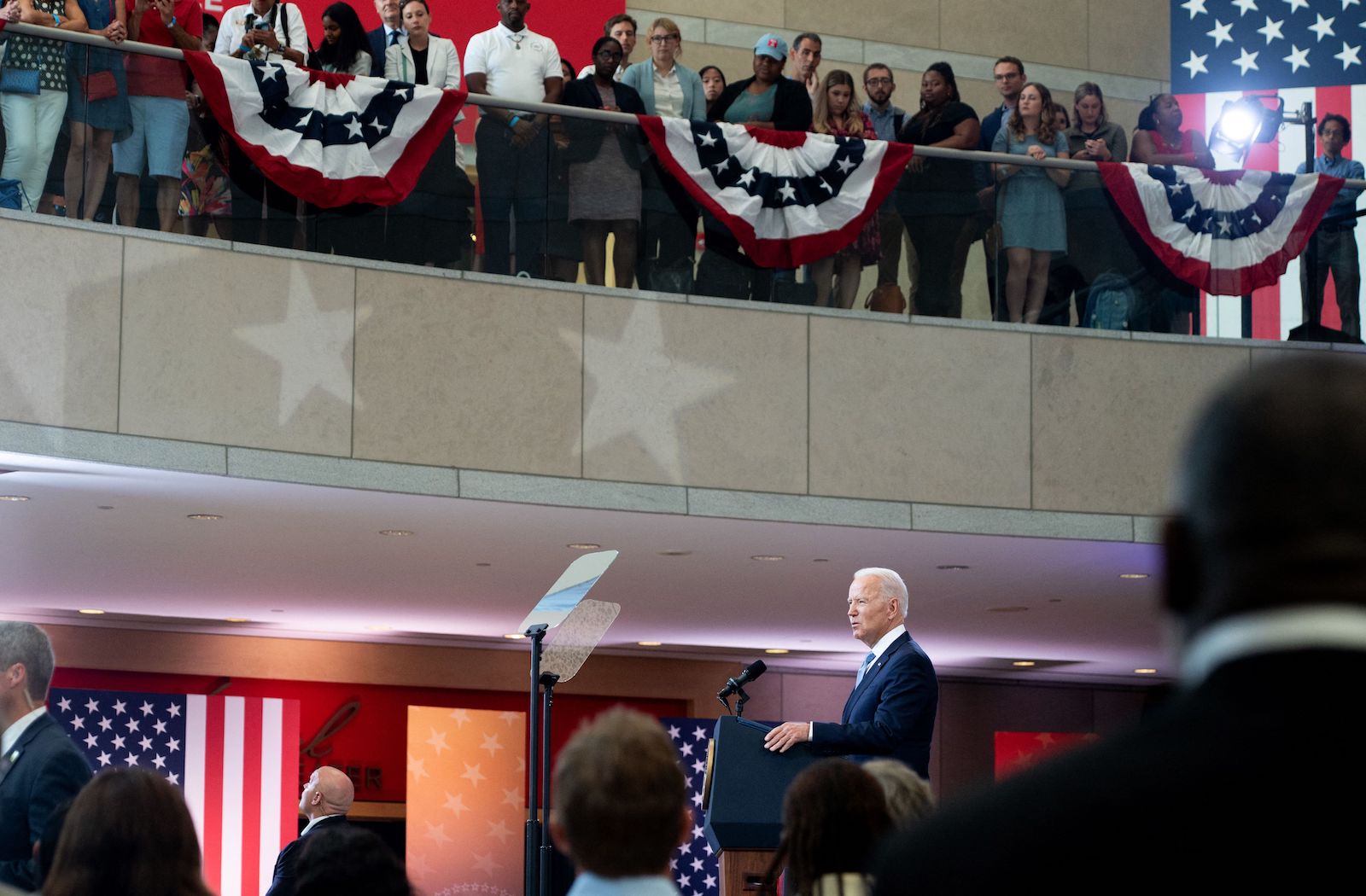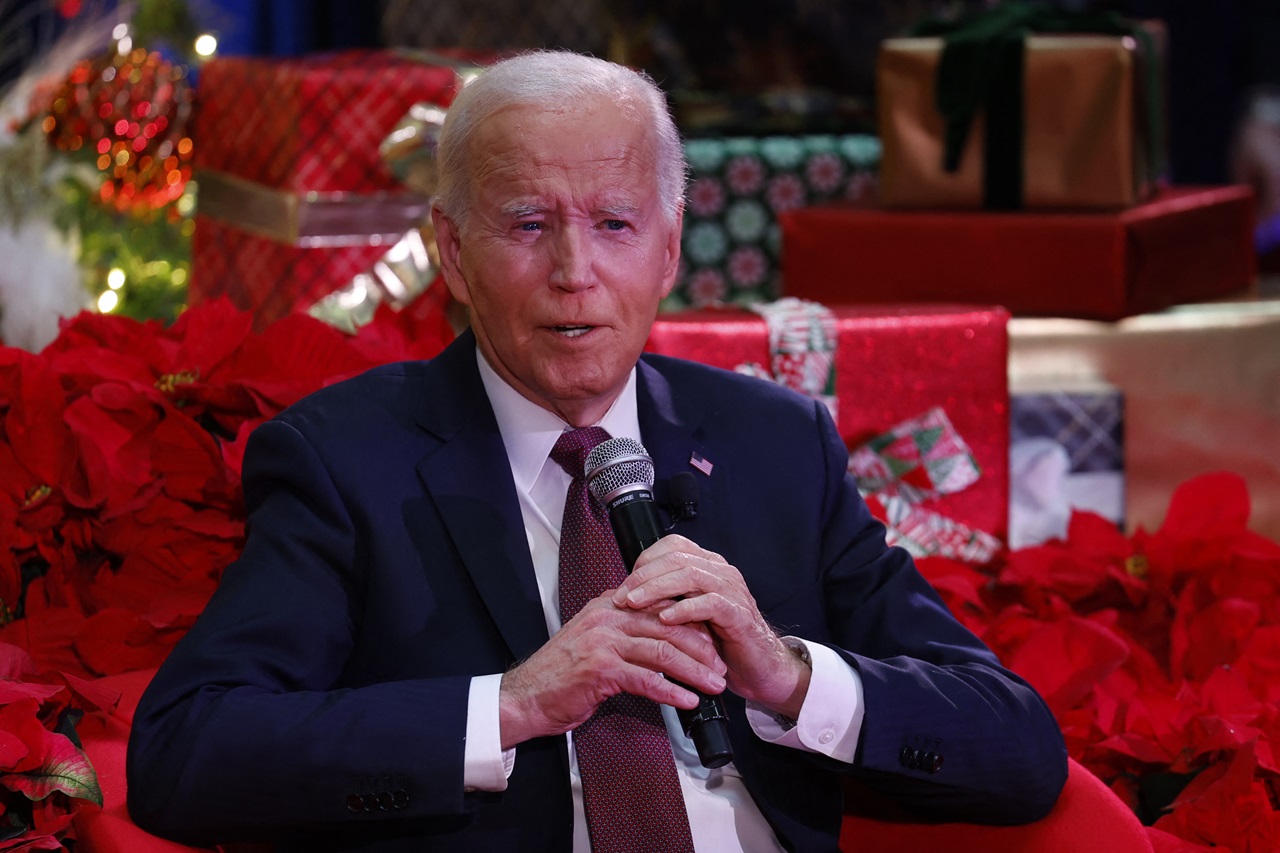
Black and Latino voters have the most at stake following Biden’s speech in Philadelphia
In coming to Pennsylvania, where we continue to see the state play such a critical role in the outcome of elections, it’s clear Biden knows the stakes.
On Tuesday, July 13, President Joe Biden stopped in Philadelphia to deliver an address on voting rights. Immediately after the 2020 election, Biden took up the voting rights initiative as a central theme of his presidency. Even before he was sworn into office, the nation witnessed insurrection at the capitol, a contested election in multiple states, and a revamped affront on voting rights in the form of dozens of bills across the country.
Biden’s visit to Philadelphia, however, also functioned as a way to reassure allies that despite the For the People Act — H.R.1 — being all but tabled, the fight against these Republican-led efforts will continue. In 2020, Biden said strengthening the voting rights act would be one of his initial priorities in office.
Across multiple states, including Pennsylvania, Georgia, Texas and Arizona, Republican-led ventures to restrict voting rights has the Democratic Party on edge. A Supreme Court Ruling earlier this month weakened a key enforcement clause of the Voting Rights Act for a second time since 2013.
In his speech Tuesday, Biden said that while the Supreme Court’s decision was harmful, it doesn’t stop Congress from repairing the damage.
“As soon as Congress passes the For the People Act and the John Lewis Voting Rights Advancement Act, I will sign it and let the whole world see it.” he said.
But both bills are currently stalled.
H.R. 1 passed the Democrat-controlled House on March 2, but it faces an increasingly difficult battle in the Senate. Every Democrat in the Senate, with the exception of Joe Manchin (D-WV) supports the voting rights bill. Not one Republican supports the nearly 800-page measure, meaning Democrats are unlikely to win support from any without costly moves to compromise.
The bill will likely not pass the Senate, but it has laid out a groundwork for targeted reforms that could be pursued.
But the clock is ticking.
As of May 14, 2021, legislators across 48 states have introduced 389 bills with restrictive provisions. This is according to the Brennan Center for Justice, which has been tracking these efforts.
It reports that at least 22 bills have already been enacted, and 31 have passed at least one chamber of government.
“While this broad assault is not unprecedented,” Biden said in his speech. He added, “they’re not only targeting people of color. They're targeting voters of all races and backgrounds with a simple target. Who did not vote for them? It’s unconscionable.”
He called for the creation of a coalition of leaders to raise the urgency of the moment, but as these bills continue to advance through state legislatures across the nation, other leaders are calling for more direct approaches.
In an interview with Janet Murguía, the President and CEO of UnidosUS, she told AL DÍA that the situation is especially dire in Pennsylvania because of the margin of victory seen in the 2020 presidential election.
We had the largest turnout of Latino voters in US history in 2020, but these gains are being threatened. Our ability to reach potential voters is at stake if we do not stop voter suppression efforts and take affirmative steps to protect the #righttovote for ALL Americans.
— Janet Murguía (@JMurguia_Unidos) July 13, 2021
“We need to ensure there are federal protections and national standards that states will have to adhere to,” she said.
This could mean breaking apart the For the People Act into smaller provisions to get a semblance of a voter rights agenda to advance, or maybe the Democratic Congress will need to get more forceful in passing legislation.
However, Pennsylvania isn’t in a position like Texas, where the Democratic State legislature is doing away with bipartisanship, breaking quorum this week in an effort to block several Republican-led initiatives, including bills that could intimidate voters at the polls.
“Each legislature is different, but what we’re seeing is a pattern among these Republican-led legislatures, basically again to make it harder for communities of color and others who are in poorer communities, to vote by mail, eliminating efforts to vote by mail, to restrict early voting, and also to limit the polling sites,” Murguía said.
In his speech, Biden recalled the audits of the 2020 election conducted in its aftermath. From Arizona, Wisconsin, Georgia, and now the attempt in Pennsylvania — each of these states changed the course of the election in favor of Biden.
RELATED CONTENT
The margin of victory, especially in Arizona and Pennsylvania, would have been much closer without Latino voters. Mexican-American mobilizers in Arizona were the early indicators of Biden’s victory in Arizona, when the state flipped Blue, and the election was finally called with a close margin in Pennsylvania.
“We turned out the largest number of Latino voters in U.S. history in this past election, and according to the Census data released last week, we know that a record 16.5 million Latinos voted in the 2020 election, and the highest turnout we’ve ever seen in Pennsylvania,” Murguía said.
Unidos’ local affiliate in Philadelphia, Congreso de Latinos Unidos, went into detail on the efforts that led to the record turnout.
Congreso was honored to be presente alongside many public officials and community leaders today to welcome President Biden to #Philadelphia as he delivered remarks on the importance of protecting Americans' constitutional right to vote and participate in the democratic process. pic.twitter.com/jJmYPfiWwH
— Congreso de Latinos Unidos (@Congreso1977) July 13, 2021
From advocating for distributed bilingual voter registration and education materials to collaborating with local partners on the daily, Vice President of External Affairs and strategic initiatives, Julia Rivera, said the pressure was on to respond to the new voting options made available and to ensure eligible voters were “informed and empowered” to exercise their right to vote.
“Congreso has been and continues to be involved in many civic engagement efforts, specifically around voting and elections,” she said. “Voting is a fundamental right protected by the Constitution and we encourage our community members to exercise their right and participate in the democratic process.”
According to Pew Research data on the 2020 election and voting, a record number of voters cast ballots by mail in 2020. This became the norm for many because of pandemic concerns, but for others, it opened a new avenue in accessibility.
It also found that Black voters were more likely to have voted early in-person — another avenue that was made more available in response to the pandemic.
Both options are now under attack.
“We have to expand efforts to vote by mail and early voting because we know how important that is for Latino voters across the country, and in Pennsylvania. We are very concerned that the progress that we’ve made in this past election is being undermined,” she said.
In coming to Pennsylvania, where the state continues to play a critical role in the outcome of elections, it’s clear Biden knows the stakes.
The margin of victory, and how close the election outcome was means that every voting bloc is important, and any effort to skew the outcome of elections in ways that disproportionately affect Black and Latino voters has the potential to shift the outcome.
The question is whether a speech is enough to mobilize legislators with the capacity to at least speak up.











LEAVE A COMMENT:
Join the discussion! Leave a comment.